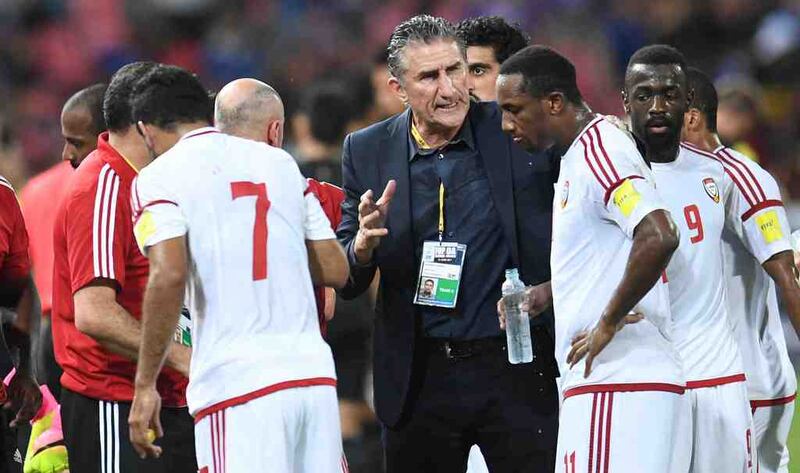The UAE filed out of the Rajamangala Stadium on Tuesday night, most barely uttering a word, in the main heads bowed and spirits broken.
Abdullah Saleh and Obaid Hubaitha, both part of the new management team with recently installed manager Edgardo Bauza in place, looked visibly drained, for Ali Mabkhout’s last-gasp equaliser did little to ease the pain.
Hamdan Al Kamali stopped to speak to the few members of the UAE media who had travelled to Thailand for the national team's must-win World Cup qualifier. He did his two flash interviews, but it was clear the experienced centre-back wanted to board the bus and break free from Bangkok, free from the realisation that now, as he put it, "there is no chance for us".
__________________________________
Read more
■ Edgardo Bauza: New UAE manager 'not happy at all' after Thailand draw dents World Cup dream
■ Report: UAE's hopes of reaching 2018 World Cup almost over after 1-1 draw in Thailand
■ Talking points: Bauza needs more from Khalil and Abdulrahman in need of support
__________________________________
Club teammate Ismail Matar offered his thoughts, too, and the pain etched across the Al Wahda forward’s face was palpable.
At 34, one of the UAE’s most celebrated players will most likely end his career without experiencing competing at a World Cup. Fulfilling “every footballer’s dream”, as he said in the build up.
Matar was involved in the build up to Mabkhout’s goal, the substitute nodding the ball into the striker’s path before he applied a calm finish.
But it was not enough: a solitary point when three were required, two matches left in the final stage of qualification and too many permutations to plot the route to Russia.
As it stands, the UAE are fourth in Group B, six points from even a play-off spot. Their goal difference on Saudi Arabia and Australia, the two teams directly above them, does not make for pleasant reading, either.
Although still mathematically possible, the likelihood is that the UAE’s bid for a second World Cup appearance will drag on another four years, another painstaking cycle for this collection of players. For the “golden generation”.
The inquest will likely begin back in Dubai, where Bauza will spend a few days before travelling to Argentina for a few weeks. Then he starts to rebuild, restore the dented confidence and reroute the UAE beyond this World Cup campaign.
To all intents and purposes, the decline began long before Bauza was appointed as Mahdi Ali’s successor. Five weeks in the job, two of those with his entire squad, was never going to constitute the requisite time to turn around this team. There were injuries and other mitigating circumstances to manage.
Yes, the UAE must give everything in their final two Group B fixtures. Yes, qualification is a long shot. Yet they should do whatever they can to defeat Saudi Arabia on August 29 and defeat Iraq seven days later.
But Bauza highlighted in Tuesday’s post-match press conference that he possesses “a plan and a vision”.
The inference was that it extends past September 5 and towards the Gulf Cup of Nations, which is scheduled to take place in December – perhaps in the UAE, given the political situation with hosts Qatar. Then there is the 2019 Asian Cup, to be staged in the UAE. They represent infinitely more realistic targets than next year’s World Cup.
After all, Bauza’s contract runs through to February 2019, when the Football Association will hope its decision to delay Mahdi Ali’s resignation and then to employ Bauza will bear fruit.
He is still under pressure to succeed, though, to prove those ill-fated eight months with the Argentina national team from August last year are not a true reflection of his international coaching pedigree.
Changes must be made. The UAE have the nucleus of a talented team, spearheaded by Asia’s Player of the Year, but Omar Abdulrahman cannot be expected to carry forward the side alone. And he is not, what with Mabkhout, Ahmed Khalil, Khamis Esmail and Ahmed Barman in theory offering smart support. There has to be all-round improvement.
Al Ahli midfielder Majed Hassan will be integral, too, should he ever stave off injury long enough to validate his tag as one of the most gifted footballers of this generation.
Meanwhile, Khalfan Mubarak’s role will no doubt increase, if he continues to develop and Bauza is prepared to compromise on his defensive bent. There are others in the squad, as well, who can play important parts in the team.
The management need to be bold and the players willing to become better, both on and off the pitch. Only then can the UAE shoot for success at the Gulf Cup and at the Asian Cup. And then perhaps, they will finally get to fulfil “every footballer’s dream”.
Follow us on Twitter @NatSportUAE
Like us on Facebook at facebook.com/TheNationalSport






